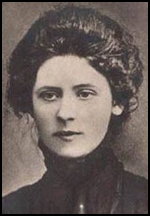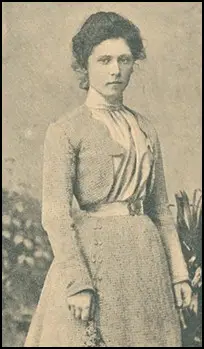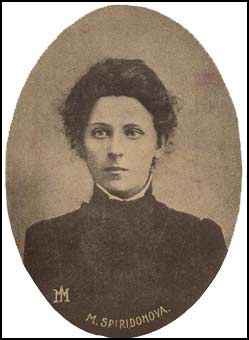Maria Spiridonova

Maria Spiridonova, the daughter of a bank official, was born in Tambov on 16th October, 1884. According to Leonid Laparenok: "Maria grew up a romantic-minded young girl, brought up on the traditions of Russian literature, with its tales sympathetic to the insulted and humiliated. This literature and upbringing largely determined the course of her life."
Spiridonova studied dentistry in Moscow. In March 1905 she was arrested during a student demonstration. Soon afterwards she joined the before joining the Socialist Revolutionary Party. During the 1905 Revolution the police brutally suppressed a peasant uprising.
Louise Bryant, the author of Six Months in Russia (1918) has argued: "Luzhenovsky had as dark a record as any official ever possessed. He went from villagee to village taking an insane, diabolical delight in torturing people. When peasants were unable to pay their taxes or offended him in any way at all, he made them stand in line many hours in the cold and ordered them publicly flogged. He arrested any one who dared hold a different political view from his own; he invited the Cossacks to commit all sorts of outrages against the peasants, especially against the women."
On 16th January, 1906, Spiridonova assassinated Police Inspector Gavril Luzhenovsky who had ordered the attack. Spiridonova was immediately captured by Luzhenovsky's Cossack bodyguards and imprisoned. Spiridonova later told Louise Bryant what happened next: "First the Cossacks beat her and threw her quite naked into a cold cell. Later they came back and commanded her to tell the names of her comrades and accomplices. Spirodonova refused to speak, so bunches of her long, beautiful hair were pulled out and she was burned all over with cigarettes. For two nights she was passed around among the Cossacks and the gendarmes."
Spiridonova appeared in court on 11th March, 1906. Her lawyer argued: "It is not just the humiliated and sick Maria Spiridonova standing in front of you; it is the humiliated and sick country of Russia itself... this entire country shudders with pain and horror. Someday we must put an end to this animosity. Come out from your deliberation with an olive branch, not with a raised sword." Spiridonova was sentenced to death by hanging. This was later commuted to a lifetime in exile.

Maria Spiridonova was sent to Akatui in Siberia. She spent most of her spare-time reading: "I learned languages. You see, it is a purely mechanical business and therefore a wonderful soother of nerves. It is like a game and one gets deeply interested. I learned to read and speak English and French in prison." There were two attempts to rescue Spiridonova but she did not achieve her freedom until Prince George Lvov gained power following the overthow of Tsar Nicholas II.
After her release she once again became active in the Socialist Revolutionary Party and in March, 1917, blew up Chita Prison. Robert V. Daniels, the author of Red October: The Bolshevik Revolution of 1917 (1967) has argued: "Led by the intransigent Boris Kamkov and a frail but dynamic young woman, Maria Spiridonova, and fired by a tradition of peasant anarchism, the Left SRs repudiated the Provisional Government and took a stand on land and peace scarcely different from the Bolsheviks. They attracted the lion's share of the SR following in the army; by August they had the upper hand in the Soldier's Section of the Petrograd Soviet. In September they captured the Petrograd city organization of the SR party. After the Democratic Conference the Left SRs were to all intents and purposes an independent party, cooperating closely - they thought - with the Bolsheviks."
Spiridonova was interviewed by the American journalist, Louise Bryant, in 1917: "If she were not such a clear thinker and so inspired a person, her leadership of the physical giants would be ludicrous. Spirodonova is barely five feet tall. She may weigh 100 pounds and she may weigh less. She has big grey eyes circled with blue rings, and soft brown hair which she wears in a coronet braid... I have not met a woman her equal in any country."
Spiridonova told Bryant that she was raising an army to fight the Bolsheviks. "We have made secret inquiries and we know we will have enough men; they will all be volunteers; there must be no compulsion.... They (most peasants) consider the Russian revolution an adventure and they hold aloof, but the Russian revolution is much more than that, even if it fails for the present. It is the beginning of social revolution all over the world; it is social revolution here in full suing! The whole country is taking part in it now. My reports come in from the remotest districts. The peasants are already conscious and are making social changes everywhere."
Spiridonova compained about the way the Russian Revolution was being dominated by men. "I am afraid I will sound like a feminist, but I will tell you my theory. You will remember that before the revolution as many women as men went to Siberia; some years there were even more women... Now that was all a very different matter from holding public office. It needs temperament and not training to be a martyr. Politicians are usually not very fine, they accept political positions when they are elected to them - not because they are especially fitted for them. I think women are more conscientious. Men are used to overlooking their consciences - women are not."
Victor Serge has pointed out: "The Left Social-Revolutionaries, led by Boris Kamkov and Maria Spiridonova, had first boycotted the bolshevik authorities, then collaborated with them, and then, in July 1918, raised an insurrection against them, proclaiming their intention to govern alone." She was elected to the Constituent Assembly but it was closed down by the Bolsheviks in 1918.

In 1920, Spiridonova was arrested by the Bolsheviks. According to Leonid Laparenok: "Spiridonova was taken from her bed while sick with typhus. She was kept in the prison hospital, but later was transferred to a mental institution where Maria went on a hunger strike. At the time, an International Women’s Congress was taking place in Moscow. Spiridonova was still quite a popular female figure, and the Congress interceded on her behalf and asked Trotsky to allow Spiridonova to leave Russia – a request denied by the Bolsheviks, whose decision was motivated by the fact that she was still a danger to Soviet power. Ironically, this made Spiridonova even more popular, leading to her becoming one of the most popular women of her time. A special committee in Paris published postcards with her portrait in an attempt to make it possible for Maria to move to France and Germany while Spiridonova was sent into exile to Samarkand."
Spiridonova lived in Ufa with a group of Left Social-Revolutionaries. It is claimed by Russian historian, Alexander Rabinowitch, that she was not involved in politics. However, in 1937, Joseph Stalin gave orders for her arrest and she was sent to Oryol Prison. It has been claimed that "the guards treated her as harshly as the Czarist police a few decades earlier".
On 11th September, 1941, Spiridonova, together with 162 other political prisoners, and was executed by the NKVD in the Medvedev Forest.
Primary Sources
(1) Louise Bryant, Six Months in Russia (1918)
Marie Spirodonova looks as if she came from New England. Her puritanical plain black clothes with the chaste little white collars, and a certain air of refinement and severity about her seem to belong to that region more than to mad, turbulent Russia-yet she is a true daughter of Russia and of the revolution. She is very young-just past thirty-and appears exceedingly frail, but she has the wiry, unbreakable strength of many so-called "delicate" people, and great powers of recuperation.
Her early history as a revolutionist is exceptional even in the minds of the Russians, and they have grown used to great martyrs. She was nineteen when she killed Luzhenovsky, Governor of Tambov. Luzhenovsky had as dark a record as any official ever possessed. He went from villagee to village taking an insane, diabolical delight in torturing people. When peasants were unable to pay their taxes or offended him in any way at all, he made them stand in line many hours in the cold and ordered them publicly flogged. He arrested any one who dared hold a different political view from his own; he invited the Cossacks to commit all sorts of outrages against the peasants, especially against the women.
Spirodonova was a student in Tambov; she was not poor and she suffered no personal discomfort, but she could not bear the misery about her. She decided to kill Luzhenovsky. One afternoon she met him in the railway station. The first shot she fired over his head to clear the crowd, the next she aimed straight at his heart, and Spirodonova has a steady hand as well as a clear head. Luzhenovsky was surrounded by Cossacks at the time. They arrested Spirodonova.
First the Cossacks beat her and threw her quite naked into a cold cell. Later they came back and commanded her to tell the names of her comrades and accomplices. Spirodonova refused to speak, so bunches of her long, beautiful hair were pulled out and she was burned all over with cigarettes. For two nights she was passed around among the Cossacks and the gendarmes. But there is an end to all things; Spirodonova fell violently ill. When they sentenced her to death she knew nothing at all about it, and when they changed the sentence to life imprisonment she did not know. She was deported to Siberia in a half-conscious condition. None of her friends ever expected to see her again.
When the February revolution broke out eleven years later she came back from Siberia and offered her life again for freedom....No other woman in Russia has quite the worship from the masses of the people that Spirodonova has. Soldiers and sailors address her as "dear comrade" instead of just ordinary "tavarish." She was elected president of the first two All-Russian Peasant Congresses held in Petrograd and she swayed those congresses largely to her will. Later she was chairman of the executive committee of the Peasants' Soviets and she is an extremely influential leader in the Left Socialist Revolutionist party.
When the Bolsheviki came into power they took over the land programme of the Socialist Revolutionists. This brought about great turmoil in the party. The Right maintained that it was their programme and no one had the right to steal it, but Spirodonova and all her wing only laughed.
"What difference does it make," she wanted to know, "who gives the peasants their land-the principal thing is that they get it."
The first time I saw Spirodonova was at the Democratic Congress. Orators had been on the platform arguing about coalition for hours. A hush fell over the place when she walked on the stage. She spoke for not more than three minutes, giving a short, concise, clear argument against coalition. She began:
"Krestian - peasants - if you vote for coalition you give up all hope of your land!"
The great palace shook with the roaring protests of the proletariat against coalition when she ceased. Millions of peasants trust her implicitly and move with her judgment almost invariably. She has the greatest political following of any woman in the world.
If she were not such a clear thinker and so inspired a person, her leadership of the physical giants would be ludicrous. Spirodonova is barely five feet tall. She may weigh 100 pounds and she may weigh less. She has big grey eyes circled with blue rings, and soft brown hair which she wears in a coronet braid. She works on an average of about sixteen hours a day, and everybody in Russia pours into her office at 6 Fontanka to ask advice.
I used to go there and she would tell me interesting stories. One day I took in a Russian girl who belonged to the Menshevik party and who, therefore, was opposed to Spirodonova. She sat silent and listened to her for two hours. When we came out on the street the girl stopped and her eyes were full of tears.
"To think," she said, "that with such eyes and such a face she should ever kill a man! Until today I was her enemy-now I know she is the greatest woman in Russia!"
And to Spirodonova I wish also to make my salaam. I have not met a woman her equal in any country.
The last time I saw her she talked to me about the war and the possibility of a decent peace being secured at Brest-Litovsk. She had no faith in the success of the negotiations, and she was seriously working on what she called a "Socialist army." "We have made secret inquiries," she said, "and we know we will have enough men; they will all be volunteers ; there must be no compulsion." I had a vision then of Spirodonova leading her peasant-soldiers to battle instead of through the intricate mazes of politics.... She spoke sadly of the sabotagers, especially of the intellectuals. "They consider the Russian revolution an adventure and they hold aloof, but the Russian revolution is much more than that, even if it fails for the present. It is the beginning of social revolution all over the world; it is social revolution here in full suing! The whole country is taking part in it now. My reports come in from the remotest districts. The peasants are already conscious and are making social changes everywhere."
We talked about women and I wanted to know why more of them did not hold public office since Russia is the only place in the world where there is absolute sex equality. Spirodonova smiled at my question.
"I am afraid I will sound like a feminist," she confessed, "but I will tell you my theory. You will remember that before the revolution as many women as men went to Siberia; some years there were even more women... Now that was all a very different matter from holding public office. It needs temperament and not training to be a martyr. Politicians are usually not very fine, they accept political positions when they are elected to them-not because they are especially fitted for them. I think women are more conscientious. Men are used to overlooking their consciences - women are not."
(2) Robert V. Daniels, Red October: The Bolshevik Revolution of 1917 (1967)
The Kornilov affair and the Democratic Conference precipitated a development in the party of the SRs that was highly favorable to the Bolsheviks - the open split between the SR left wing and the rest of the party. Led by the intransigent Boris Kamkov and a frail but dynamic young woman, Maria Spiridonova, and fired by a tradition of peasant anarchism, the Left SRs repudiated the Provisional Government and took a stand on land and peace scarcely different from the Bolsheviks. They attracted the lion's share of the SR following in the army; by August they had the upper hand in the Soldier's Section of the Petrograd Soviet. In September they captured the Petrograd city organization of the SR party. After the Democratic Conference the Left SRs were to all intents and purposes an independent party, cooperating closely - they thought - with the Bolsheviks.
(3) Morgan Philips Price, My Three Revolutions (1969)
Next day the Congress met again. The Left S.R. delegates turned up. They had come to stage another violent onslaught on the Bolsheviks and the Government, the last, as it turned out, before they adopted other methods. The business of the morning was a report by the Chairman, Sverdlov, on the activities of the Government. He described in some detail the methods now being adopted to secure food from the villages in North and Central Russia. Committees of Poor Peasants had been formed in the villages to obtain food deliveries from the more well-to-do peasants.
"Leave it to the free peasants to form their own communes inspired with revolutionary enthusiasm,' cried Marie Spiridonova, that Valkyrie of the Russian Revolution. Pale, and with a savage look on her face, she proceeded to deliver an absolute Philippic against the Soviet Government and all its works. One realized now that, if this romantic revolutionary enthusiasm from the past could not be tamed, the Revolution would go down in chaos. When Spiridonova sat down, roars of applause came from the whole Left SR membership, the Bolsheviks sitting silent. Then the Left S.R.s all rose and left the Congress, this time for good. Sverdlov then adjourned the Congress till the afternoon.
